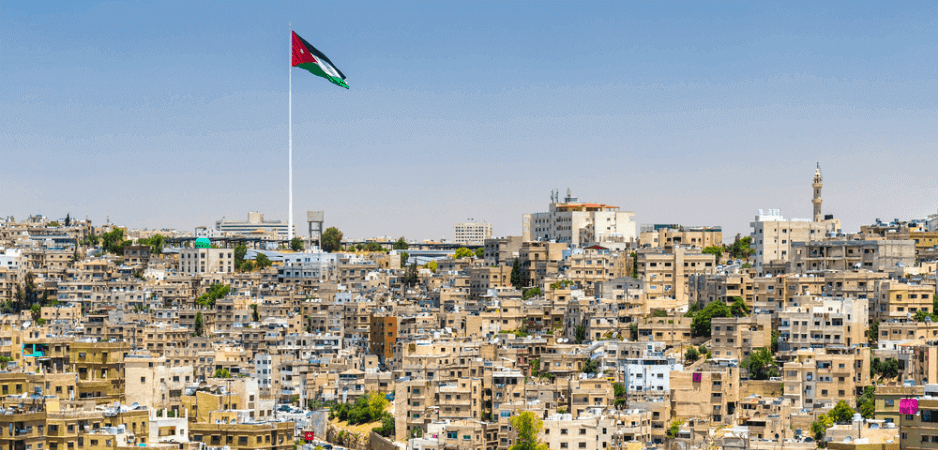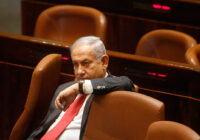The West needs to understand the present connection between Jordan’s economy and its politics.
Since 2011, Jordan has been facing a wide range of pressures — political, economic, demographic, security and military — due mainly to the continuing anarchy in neighboring Iraq and Syria that has driven hundreds of thousands of refugees to seek shelter in the Hashemite Kingdom. The poor economic conditions in Jordan threaten to create a magnet for jihadists, extremists and terrorists, with the Jordanian government warning that it cannot accommodate more Syrian refugees, seeking means to avert a new calamity. An urgent monetary bailout is needed to avert a deeper security crisis by addressing the dearth of natural resources and providing facilities to improve the living conditions for Jordanians who have lost confidence that a government reshuffle can save the country.
The West needs to understand the present connection between Jordan’s economy and its politics. Jordan’s total public debt stood at $39 billion end of April, with official figures showing that the kingdom’s public debt increased to 96% of the country’s GDP, with unemployment at 18%. Widespread protests over the government’s economic policy forced the resignation of Prime Minister Hani al-Mulki in June and the appointment by King Abdullah II of a liberal successor, Omar Razzaz, who has been tasked with carrying out an urgent financial austerity plan to cut public expenditure.
With political and economic unrest widespread, Jordan appears fragile and prone to higher security threats, which could be exacerbated by the Syrian government forces preparing for a major assault to recover Deraa, al-Suwaida and al-Quneitra from the armed opposition. Since July 2017, Russia, the US and Jordan have reached an agreement to set up de-escalation zones in Syria, including southern parts of the country near the Jordanian border. At present, Syrian and Russian preparations are in progress to liberate the three provinces. Helicopters dropped flyers over Deraa in June asking rebels to put down their arms, resolve their dispute with the Syrian government and not waste their lives by facing sure death.
At the end of June, fears have doubled due to a breakout of fighting between Syrian troops (backed by Russian airstrikes) with rebels in the southwest of Syria. The Israeli government has warned the Syrian army and its allies that Israel “could attack Damascus’ forces if they try to deploy in a demilitarized border zone while advancing against rebels in the region.” This entails that the Syrian army should not deploy troops in al-Quneitra province. As for Jordan, the troubled areas in southwest Syria, mainly in Deraa province, border Jordanian villages, raising fears of intrusion by militants into Jordan.
Moscow says that it has already arranged an agreement with Amman and Washington to force Iranian troops and the militias fighting under its supervision to redeploy 60 kilometers from the Israeli frontiers and 25 kilometers from the Jordanian borders to ensure that there would be no military threat to both countries. With this, Jordan could stem the inflow of both Syrian militants and refugees into the kingdom.
On July 6, the Syrian rebels agreed to hand over their heavy weapons to the Russian troops who brokered a ceasefire deal between the Syrian regime and the rebels in southern Syria. This is deemed a major victory for the Syrian President Bashar al-Assad, whose troops managed to recover the Nassib border crossing with Jordan, which was held by the opposition forces for more than three years.
The decision to start the battle in south Syria has been taken at the highest levels in Damascus and Moscow, with some attempts at reconciliation between the rebels and the Syrian army. The American administration informed the rebels in southern Syria that they would not receive any American support. This has encouraged the Russians to launch airstrikes in the south to pave the way for the Syrian armed forces to start their offensive, with the Syrian regime reinforcing its sites in Deraa and entering new villages and outskirts.
Amman has said earlier that the situation in south Syria is critical, calling on both Moscow and Washington to consider Jordanian concerns. The kingdom is a vital regional ally for the United States, starting from cooperation in the war on terror to the issues of housing refugees. The consequences of the war in Syria, the influx of refugees and the burden borne by the Jordanian economy have been on King Abdullah’s agenda during recent talks with US President Donald Trump. The monarch informed the American leadership that the cost of the war in south Syria would lead to a catastrophe not only for the Jordanian economy but its society as a whole.
Israeli Prime Minister Benjamin Netanyahu’s visit to Jordan in June and his meeting with the king has not focused only on the so-called “deal of the century” to resolve the Israeli-Palestinian conflict, but also on the offensive in south Syria near the borders of Israel and Jordan. This is confirmed by the fact that the chief of Israeli intelligence, Yossi Cohen, accompanied Netanyahu on his visit. Both countries are concerned about the presence of Iranian militias and troops near their borders and fear that if the Syrian army starts operations, the vacuum would be filled by these militias rather than by Syrian government forces.
Netanyahu’s upcoming visit to Moscow on July 11 will try to diffuse tensions between the Syrian and Israeli armies near the Golan Heights. The Israeli prime minister is looking for the deployment of the United Nations Disengagement Observer Force immediately to the ceasefire line between Syria and Israel. Such movements by Israelis and Jordanians demonstrate the level of concern for both government vis-à-vis the recent developments in south Syria.
It is hard to think of a stable Jordan without considering its northern borders with Syria. Amman wholly rejects any military adventure in the south of Syria as it would be a time bomb set against the stability of the kingdom. King Abdullah is trying to resolve these eventualities with the Americans, the Russians and other regional powers to avert another catastrophe that could impair Jordan’s economy and pose high security threats to the country’s stability.
The views expressed in this article are the author’s own and do not necessarily reflect Fair Observer’s editorial policy.
Photo Credit: Leonid Andronov / Shutterstock.com
Support Fair Observer
We rely on your support for our independence, diversity and quality.
For more than 10 years, Fair Observer has been free, fair and independent. No billionaire owns us, no advertisers control us. We are a reader-supported nonprofit. Unlike many other publications, we keep our content free for readers regardless of where they live or whether they can afford to pay. We have no paywalls and no ads.
In the post-truth era of fake news, echo chambers and filter bubbles, we publish a plurality of perspectives from around the world. Anyone can publish with us, but everyone goes through a rigorous editorial process. So, you get fact-checked, well-reasoned content instead of noise.
We publish 2,500+ voices from 90+ countries. We also conduct education and training programs
on subjects ranging from digital media and journalism to writing and critical thinking. This
doesn’t come cheap. Servers, editors, trainers and web developers cost
money.
Please consider supporting us on a regular basis as a recurring donor or a
sustaining member.
Will you support FO’s journalism?
We rely on your support for our independence, diversity and quality.






